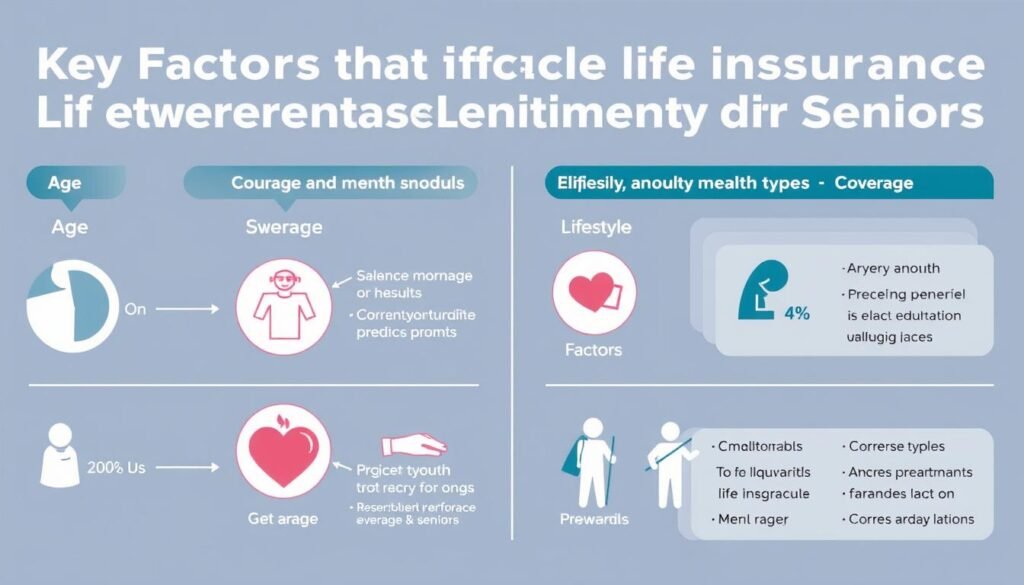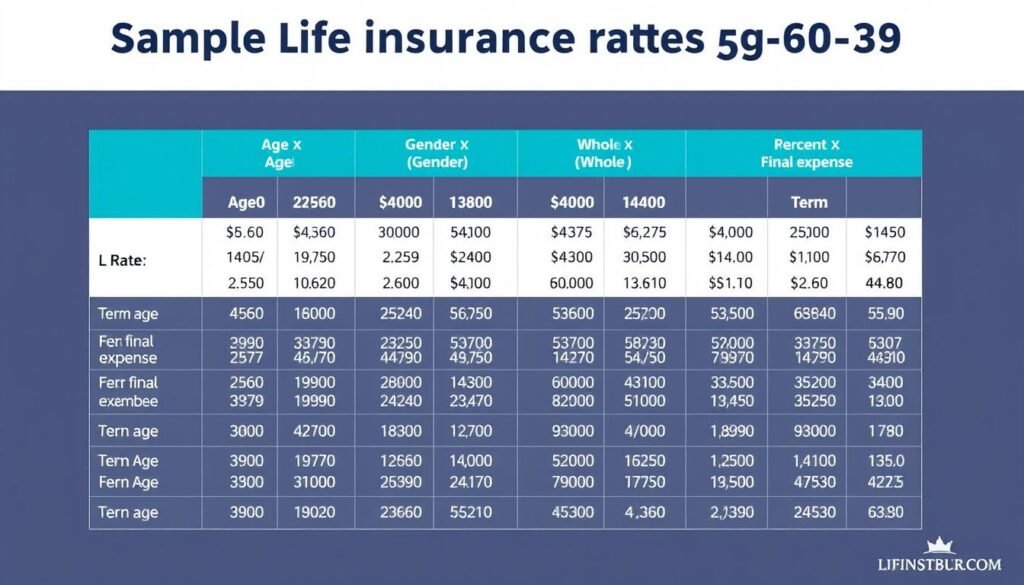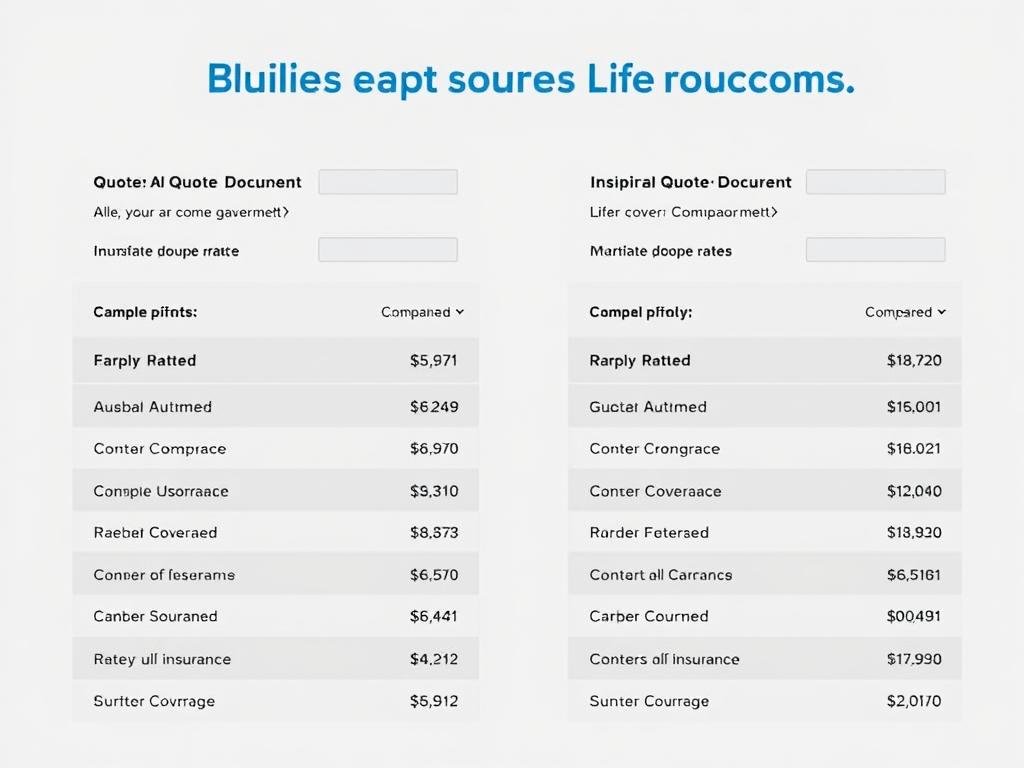Finding the right life insurance for seniors 60-69 requires understanding your unique needs and the various options available. While premiums increase with age, affordable coverage is still accessible for seniors in their sixties. Whether you’re looking to cover final expenses, leave a legacy for loved ones, or ensure your spouse’s financial security, this guide will help you navigate the life insurance landscape and find the policy that best fits your situation.
Types of Life Insurance Available for Seniors Aged 60-69
Understanding the different types of life insurance available is crucial for making an informed decision. Each type offers unique benefits and considerations for seniors in their sixties.
Term Life Insurance
Term life insurance provides coverage for a specific period, typically 10, 15, or 20 years. For seniors aged 60-69, 10-year terms are most common as longer terms become increasingly expensive or unavailable as you age.
Advantages
- Most affordable type of coverage
- Higher coverage amounts available
- Simple to understand
- Good for covering specific financial obligations (mortgage, loans)
Disadvantages
- Coverage expires after the term period
- Premiums increase significantly when renewing after age 70
- Usually requires medical examination
- No cash value accumulation
Whole Life Insurance
Whole life insurance provides permanent coverage that lasts your entire lifetime, as long as premiums are paid. These policies also build cash value over time that you can borrow against if needed.
Advantages
- Lifetime coverage that never expires
- Fixed premiums that never increase
- Builds cash value over time
- Can provide estate planning benefits
Disadvantages
- Significantly more expensive than term life
- Lower coverage amounts for the price
- May require medical examination
- Cash value builds slowly in early years
Final Expense Insurance
Final expense insurance is a type of whole life insurance specifically designed to cover end-of-life expenses such as funeral costs, medical bills, and other outstanding debts.
Advantages
- More affordable than traditional whole life
- Simplified underwriting (fewer health questions)
- Smaller coverage amounts ($5,000-$25,000)
- Permanent coverage that never expires
Disadvantages
- Limited coverage amounts
- Higher cost per thousand dollars of coverage
- May have a waiting period for full benefits
- Not designed for income replacement
Guaranteed Issue Life Insurance
Guaranteed issue life insurance is a type of whole life policy that requires no medical exam and asks no health questions. Acceptance is guaranteed regardless of health status.
Advantages
- No medical exam or health questions
- Guaranteed acceptance regardless of health
- Fixed premiums that never increase
- Permanent coverage
Disadvantages
- Most expensive type of coverage
- Limited coverage amounts ($5,000-$25,000)
- 2-3 year graded death benefit period
- Only recommended for those who can’t qualify for other policies
Not Sure Which Type of Policy Is Right for You?
Every situation is unique. Get personalized recommendations based on your specific needs and health status.
Factors Affecting Eligibility and Premiums for Seniors 60-69

Several key factors determine both your eligibility for life insurance and the premiums you’ll pay as a senior between 60 and 69 years old.
Age
Age is one of the most significant factors affecting life insurance rates. Premiums increase by approximately 4.5% to 9% each year as you age. This means that a policy purchased at age 60 will be significantly less expensive than the same policy purchased at age 69.
Health Status
Your current health and medical history play crucial roles in determining eligibility and rates. Insurance companies typically evaluate:
- Current medical conditions (diabetes, heart disease, cancer)
- Medications you’re taking
- Family medical history
- Height and weight
- Smoking status and tobacco use
- Alcohol consumption
Many seniors in their 60s have developed health conditions that can affect rates, but having a condition doesn’t necessarily mean you can’t get coverage. Different insurance companies have varying underwriting standards for specific health issues.
Coverage Amount
The amount of coverage you select directly impacts your premium. Higher coverage amounts result in higher premiums. When determining how much coverage you need, consider:
- Outstanding debts (mortgage, loans, credit cards)
- Final expenses (funeral costs average $9,000+)
- Income replacement needs for spouse
- Legacy planning goals
Policy Type
The type of policy you choose significantly affects your premium:
- Term life insurance is the most affordable option but expires after the term period
- Whole life insurance costs more but provides lifetime coverage and builds cash value
- Final expense insurance offers smaller coverage amounts at moderate prices
- Guaranteed issue policies are the most expensive but have no health requirements
Lifestyle Factors
Insurance companies also consider lifestyle factors that may affect your life expectancy:
- Occupation and job-related risks
- Hobbies (skydiving, scuba diving, etc.)
- Driving record
- Travel to high-risk countries
Important: Most insurers want to see that seniors have a primary care doctor they visit regularly, especially for term life policies. If you’re over 65 and don’t have a regular doctor, you may find it more difficult to qualify for certain policies.
Sample Life Insurance Rates for Seniors Aged 60-69

To give you an idea of what you might pay for life insurance in your sixties, here are some sample monthly rates. Keep in mind that actual rates will vary based on your specific health profile, the insurance company, and other factors.
10-Year Term Life Insurance ($250,000 Coverage)
| Age | Male (Non-Smoker) | Female (Non-Smoker) |
| 60 | $82.70 | $62.60 |
| 65 | $110.00 | $85.00 |
| 69 | $195.00 | $148.00 |
Whole Life Insurance ($100,000 Coverage)
| Age | Male (Non-Smoker) | Female (Non-Smoker) |
| 60 | $416.00 | $336.00 |
| 65 | $550.00 | $450.00 |
| 69 | $675.00 | $595.00 |
Final Expense Insurance ($10,000 Coverage)
| Age | Male (Non-Smoker) | Female (Non-Smoker) |
| 60 | $43.76 | $32.71 |
| 65 | $53.24 | $43.76 |
| 69 | $87.40 | $66.37 |
Note: These rates are examples only and may not reflect current market rates. Actual premiums will depend on your specific health profile, the insurance company, and other factors. Always get personalized quotes for the most accurate pricing.
Find Your Actual Rate Today
Get personalized quotes from top-rated insurance companies based on your specific situation.
Benefits of Securing Life Insurance in Your 60s
While premiums are higher in your sixties than they would have been in your younger years, there are still compelling reasons to secure life insurance during this stage of life.
Financial Security for Loved Ones
If you have a spouse, children, or other dependents who rely on your income or support, life insurance can provide them with financial security after you’re gone. This is especially important if you’re still working in your sixties or if your spouse would lose pension benefits upon your death.
Covering Final Expenses
The average funeral in the United States costs over $9,000, according to the National Funeral Directors Association. Life insurance can ensure your loved ones don’t face financial strain while dealing with grief. Final expense policies are specifically designed for this purpose and are often more accessible for seniors.
Debt Protection
Many seniors in their sixties still have outstanding debts such as mortgages, car loans, or credit card balances. Life insurance can help ensure these debts don’t become a burden for your family members after your passing.
Legacy Planning
Life insurance can be an effective way to leave a financial legacy for your children, grandchildren, or a favorite charity. It provides a tax-efficient method of transferring wealth to the next generation or supporting causes you care about.
Peace of Mind
Perhaps the most significant benefit is the peace of mind that comes from knowing you’ve taken steps to protect your loved ones financially. This security can allow you to enjoy your retirement years without worrying about what might happen to your family if you were to pass away unexpectedly.
“The greatest gift you can leave your family is not just your accumulated wealth, but a thoughtful plan that provides for their financial security.”
Tips for Choosing the Best Life Insurance Policy

Finding the right life insurance policy in your sixties requires careful consideration of your needs, budget, and health status. Here are some actionable tips to help you make the best decision:
Assess Your Coverage Needs
Before shopping for policies, determine how much coverage you actually need:
- Calculate outstanding debts (mortgage, loans, credit cards)
- Estimate funeral and final expenses
- Consider income replacement needs for your spouse
- Factor in any legacy goals you may have
A common rule of thumb suggests purchasing coverage equal to 8-10 times your annual income, but this may not apply to seniors who are retired or nearing retirement. Focus on your specific financial obligations and goals instead.
Compare Multiple Quotes
Insurance rates can vary significantly between companies, especially for seniors. Different insurers have different underwriting standards for various health conditions:
- Get quotes from at least 3-5 different insurance companies
- Use an independent agent who can shop multiple carriers
- Compare not just premiums but also policy features and company ratings
Understand Policy Features and Riders
Life insurance policies often come with optional features called riders that can enhance your coverage:
- Accelerated death benefit: Allows access to benefits if diagnosed with terminal illness
- Waiver of premium: Waives premiums if you become disabled
- Guaranteed insurability: Allows you to increase coverage without additional underwriting
- Long-term care rider: Provides benefits for long-term care needs
These riders can add value but also increase your premium, so choose only those that align with your needs.
Consider Your Health Status Honestly
Your health will significantly impact your eligibility and rates:
- If you’re in good health, a fully underwritten policy will likely offer the best rates
- If you have moderate health issues, simplified issue policies may be more accessible
- If you have serious health conditions, guaranteed issue policies ensure acceptance
Be honest about your health when applying. Misrepresenting information can lead to denied claims or policy cancellation.
Check Financial Strength Ratings
Choose an insurance company with strong financial ratings to ensure they’ll be able to pay claims decades into the future:
- Look for ratings from agencies like A.M. Best, Moody’s, or Standard & Poor’s
- A++ or A+ from A.M. Best indicates superior financial strength
- Consider companies that have been in business for many decades
Beware of Scams and Misleading Marketing
Unfortunately, seniors are often targeted by insurance scams:
- Be wary of unsolicited offers through mail, phone, or email
- Avoid policies advertised with “no questions asked” and unusually low premiums
- Read the fine print about waiting periods and benefit limitations
- Check that the company is licensed in your state
Warning: Always verify that an insurance agent is licensed in your state before sharing personal information or making payments. You can check agent licensing through your state’s insurance department website.
Need Help Finding the Right Policy?
Our licensed insurance advisors can help you navigate your options and find the best coverage for your specific situation.
Top 5 Life Insurance Providers for Seniors 60-69

Based on financial strength, policy options, customer satisfaction, and rates for seniors in their sixties, these five companies consistently rank among the best options:
Prudential
Best for: Overall coverage for seniors and term life insurance
Pros:
- Favorable underwriting for common senior health conditions
- Flexible income requirements beneficial for retirees
- Living benefits rider included
Cons:
- Higher premiums for younger applicants
- Maximum issue age of 75
MassMutual
Best for: Whole life insurance
Pros:
- Superior financial stability (A++ rating)
- Higher potential for dividends than competitors
- Strong conversion privileges from term to permanent coverage
Cons:
- Higher term life premiums
- Maximum issue age of 70
Mutual of Omaha
Best for: Final expense insurance
Pros:
- No-medical-exam options for older applicants
- Strong financial and customer ratings
- Higher maximum issue age (85)
Cons:
- Policies more expensive than average
- Slower application processing time
Pacific Life
Best for: People over 60 and those with certain health conditions
Pros:
- Extremely affordable across age brackets
- Favorable underwriting for many health conditions
- Low coverage minimum ($50,000) offering flexibility
Cons:
- Traditional term life not available in NY
- Not ideal for active duty military or recent bankruptcy
Protective
Best for: Affordability
Pros:
- Competitive rates for all ages and health classifications
- Flexible financial guidelines for retirement income
- Higher maximum issue age (80)
Cons:
- Not available in New York
- Minimum household income requirement of $25,000
- Limited no-medical-exam options
Compare All Options
Every situation is unique. The best life insurance provider for you depends on your:
- Specific health conditions
- Coverage needs
- Budget constraints
- State of residence
Get personalized quotes from multiple providers to find your best option.

No Medical Exam Life Insurance for Seniors 60-69

For many seniors, the medical exam requirement can be a barrier to obtaining life insurance. Fortunately, several no-medical-exam options are available for those in their sixties.
Types of No-Medical-Exam Policies
Simplified Issue Life Insurance
Simplified issue policies don’t require a medical exam but do include health questions on the application. Underwriting is less stringent than fully underwritten policies:
- Coverage typically ranges from $5,000 to $100,000
- Premiums are higher than fully underwritten policies
- Approval is faster, often within days
- Some health conditions may still lead to denial
Guaranteed Issue Life Insurance
Guaranteed issue policies require no medical exam and no health questions. Acceptance is guaranteed regardless of health status:
- Coverage typically ranges from $5,000 to $25,000
- Premiums are significantly higher
- Includes a 2-3 year graded death benefit period
- Best for those with serious health conditions
Understanding Graded Death Benefits
Most no-medical-exam policies, especially guaranteed issue policies, include a “graded death benefit” provision:
- If you die from natural causes within the first 2-3 years of the policy, your beneficiaries receive only a return of premiums paid plus interest (typically 10%)
- If death occurs by accident, the full death benefit is paid even during the waiting period
- After the waiting period ends, the full death benefit is paid regardless of cause of death
“No-medical-exam policies provide valuable coverage options for seniors with health concerns, but they come with trade-offs in terms of cost and initial benefit limitations.”
When to Consider No-Medical-Exam Coverage
No-medical-exam policies are best suited for specific situations:
- You have serious health conditions that would lead to denial of traditional coverage
- You need coverage quickly and can’t wait for full underwriting
- You have a fear of medical exams or needles
- You only need a small amount of coverage for final expenses
Important: If you’re in reasonably good health, you’ll almost always get better rates with a fully underwritten policy that includes a medical exam. Consider no-exam options only if you have specific reasons to avoid the exam.
Qualify for No-Exam Coverage Today
Get covered without the hassle of medical exams. Find out which no-exam policies you qualify for.
Frequently Asked Questions About Life Insurance for Seniors 60-69

Can I get life insurance at 65 with no medical exam?
Yes, several options are available for 65-year-olds who want to avoid a medical exam. Simplified issue policies require answering health questions but no exam, while guaranteed issue policies have no health questions or exams. Keep in mind that no-exam policies typically offer lower coverage amounts (usually $5,000-$25,000 for guaranteed issue and up to $100,000 for simplified issue) and come with higher premiums compared to fully underwritten policies.
What happens if I outlive my term life insurance policy?
If you outlive your term life insurance policy, the coverage simply ends, and you receive no benefits or refund of premiums paid (unless you purchased a return of premium rider). At this point, you have several options:
- Renew the policy (often at a much higher premium)
- Convert to a permanent policy (if your policy includes a conversion option)
- Apply for a new policy (which will be more expensive due to your increased age)
- Go without life insurance if you no longer need coverage
Is life insurance worth it after age 60?
Life insurance can absolutely be worth it after age 60, depending on your specific circumstances. Consider these factors:
- Do you have dependents who rely on your income?
- Do you have outstanding debts that would burden your loved ones?
- Do you want to cover your funeral expenses?
- Do you want to leave a financial legacy?
If you answered yes to any of these questions, life insurance may be valuable for you. While premiums are higher at this age, the peace of mind and financial protection for your loved ones can make it worthwhile.
What medical conditions might disqualify me from getting life insurance?
While underwriting standards vary by company, some conditions that might make traditional life insurance difficult to obtain include:
- Recent cancer diagnosis or active cancer
- Recent heart attack or stroke (within 1-2 years)
- Severe COPD or other advanced respiratory disease
- Advanced diabetes with complications
- Alzheimer’s disease or dementia
- Terminal illness with short life expectancy
However, even with these conditions, guaranteed issue policies are still available, and some specialized insurers may offer coverage for certain high-risk conditions. Working with an independent agent who knows which companies are more lenient with specific health issues can help you find coverage.
How does the two-year waiting period work with guaranteed issue policies?
The two-year waiting period, also called a “graded death benefit period,” works as follows:
- If you die from natural causes within the first two years of the policy, your beneficiaries receive only the premiums you paid plus interest (typically 10%)
- If you die from accidental causes during this period, the full death benefit is paid
- After the two-year period ends, your beneficiaries receive the full death benefit regardless of cause of death
This waiting period protects insurance companies from individuals who are terminally ill and purchase policies knowing they will likely die soon. Without this provision, guaranteed issue policies would not be financially viable for insurers to offer.
Can I have multiple life insurance policies?
Yes, you can have multiple life insurance policies from different companies. There’s no legal limit to how many policies you can own. Some reasons you might consider multiple policies include:
- Layering coverage for different time periods and needs
- Supplementing employer-provided coverage
- Diversifying across different insurance companies
- Adding specialized coverage for specific needs
However, insurance companies will look at your total coverage across all policies to ensure it’s reasonable for your financial situation. They want to make sure you’re not over-insured relative to your income and assets.
Have More Questions?
Our insurance experts are ready to answer all your questions about life insurance for seniors aged 60-69.
Or
Finding the Right Life Insurance Coverage in Your 60s

Securing the right life insurance policy in your sixties is an important part of comprehensive financial planning. While premiums are higher than they would have been at a younger age, the peace of mind and financial protection for your loved ones can make it a worthwhile investment.
Remember that the best policy for you depends on your specific circumstances, including your health, financial obligations, and legacy goals. Take the time to assess your needs, compare multiple options, and work with a reputable insurance provider or independent agent who can guide you through the process.
Whether you choose term life for temporary coverage, whole life for permanent protection, or a specialized product like final expense insurance, the most important step is to take action. By securing appropriate coverage now, you’re providing valuable financial protection for your loved ones and creating greater peace of mind for yourself.
Ready to Secure Your Family’s Financial Future?
Get personalized life insurance quotes tailored to your specific needs and budget.


